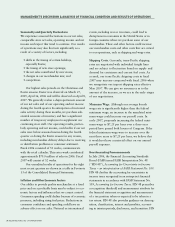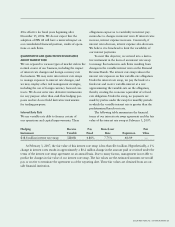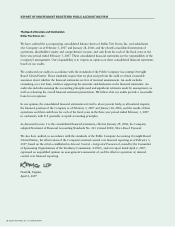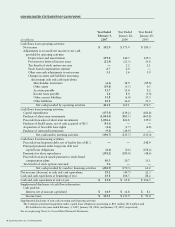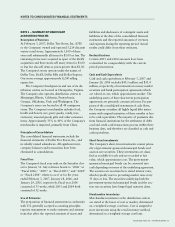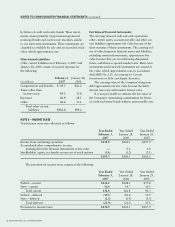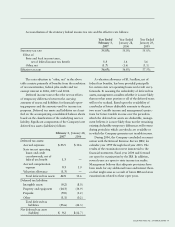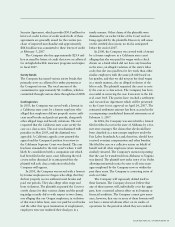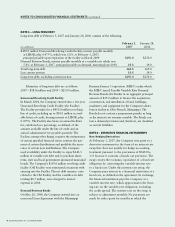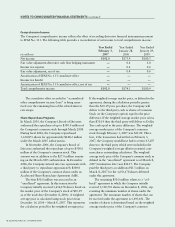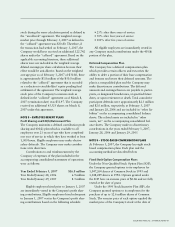Dollar Tree 2006 Annual Report Download - page 36
Download and view the complete annual report
Please find page 36 of the 2006 Dollar Tree annual report below. You can navigate through the pages in the report by either clicking on the pages listed below, or by using the keyword search tool below to find specific information within the annual report.
January 29, 2006. In accordance with the modified
prospective method of implementation, prior period
financial statements have not been restated to reflect
the impact of SFAS 123R. During 2006, the Company
recognized $1.8 million of stock-based compensation
expense as a result of the adoption of SFAS 123R.
Total stock-based compensation expense for 2006
and 2005 was $6.7 million and $2.4 million, respec-
tively. There was no stock-based compensation
expense for 2004. Through January 28, 2006, the
Company applied the intrinsic value recognition and
measurement principles of APB Opinion 25 and related
Interpretations in accounting for its stock-based
employee compensation plans. Prior to the adoption
of SFAS 123R, the Company reported all tax benefits
resulting from the exercise of stock options as
NOTES TO CONSOLIDATED FINANCIAL STATEMENTS (continued)
operating cash flows in the Consolidated Statements of
Cash Flows. SFAS 123R requires cash flows resulting
from the tax deductions in excess of the tax benefits
of the related compensation cost recognized in the
financial statements (excess tax benefits) to be classi-
fied as financing cash flows. Thus, the Company has
classified the $5.6 million of excess tax benefits recog-
nized in 2006 as financing cash flows. Excess tax
benefits of $1.2 million and $2.1 million recognized
in 2005 and 2004, respectively, prior to the adoption
of SFAS 123R, are classified as operating cash flows.
If the accounting provisions of SFAS 123 had
been applied to 2005 and 2004, the Company’s net
income and net income per share would have been
reduced to the pro forma amounts indicated in the
following table:
34 DOLLAR TREE STORES, INC. • 2006 ANNUAL REPORT
Year Ended Year Ended
January 28, January 29,
(in millions, except per share data) 2006 2005
Net income as reported $173.9 $180.3
Add: Total stock-based employee compensation expense included
in net income, net of related tax effects 1.5 —
Deduct: Total stock-based employee compensation expense determined
under fair value based method, net of related tax effects (18.2) (13.0)
$157.2 $167.3
Net income per share:
Basic, as reported $ 1.61 $ 1.59
Basic, pro forma under FAS 123 1.45 1.48
Diluted, as reported $ 1.60 $ 1.58
Diluted, pro forma under FAS 123 1.44 1.47
On December 15, 2005, the Compensation
Committee of the Board of Directors of the Company
approved the acceleration of the vesting date of all
previously issued, outstanding and unvested options
under all current stock option plans, including the
1995 Stock Incentive Plan, the 2003 Equity Incentive
Plan and the 2004 Executive Officer Equity Incentive
Plan (EOEP), effective as of December 15, 2005. At
the effective date, almost all of these options had
exercise prices higher than the actual stock price. The
Company made the decision to accelerate vesting of
these options to give employees increased perform-
ance incentives and to enhance current retention.
This decision also eliminated non-cash compensation
expense that would have been recorded in future
periods following the Company’s adoption of SFAS
123R on January 29, 2006. Compensation expense,
as determined at the time of the accelerated vesting,
has been reduced by $14.9 million, over a period of
four years during which the options would have
vested, as a result of the option acceleration program.
This amount is net of compensation expense of $0.1
million recognized in fiscal 2005 for estimated forfei-
ture of certain (in the money) options.
The Company recognizes expense related to the
fair value of restricted stock units (RSUs) over the
requisite service period. The fair value of the RSUs is
determined using the closing price of the Company’s
common stock on the date of grant.
On March 30, 2007, the Board of Directors
granted approximately 0.3 million restricted stock
units and options to purchase 0.4 million shares of
the Company’s common stock under the Company’s
Equity Incentive Plan and the EOEP.


